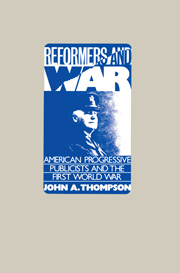5 - Foreign policy and the debate over intervention
Published online by Cambridge University Press: 24 November 2009
Summary
The relationship between progressivism and attitudes to foreign policy has been a subject of dispute among historians. The controversy originated with a provocative essay by William E. Leuchtenburg in 1952 arguing that “imperialism and progressivism flourished together because they were both expressions of the same philosophy of government” and that progressives, “with few exceptions, ardently supported the imperialist surge or, at the very least, proved agreeably acquiescent.” The latter conclusion has been effectively challenged by scholars who have analyzed the attitudes of members of Congress, particularly progressive Republican senators, to those issues that Leuchtenburg took to be indicators of “imperialism” – increased naval and military appropriations and a firm defense of American neutral rights as well as U.S. intervention in Latin America. In the face of such evidence, those who seek to reestablish Leuchtenburg's basic thesis have had to resort to a much broader definition of “imperialism,” including not only colonialism and overseas military intervention but also commercial expansion and a belief in the universal relevance of “the American model” of republican democracy combined with capitalist economic development. This makes it possible to maintain that “despite the differences of approach among progressives, and the division over America's military actions in the world, there was an overriding agreement among them about America's future role in the world.” True though this doubtless is at some level of generality, it not only fails to identify any distinctively progressive attitude to foreign policy, but both minimizes and leaves unexplained differences of opinion about the particular policy choices that were confronted, debated, and decided in these years.
- Type
- Chapter
- Information
- Reformers and WarAmerican Progressive Publicists and the First World War, pp. 117 - 176Publisher: Cambridge University PressPrint publication year: 1987



